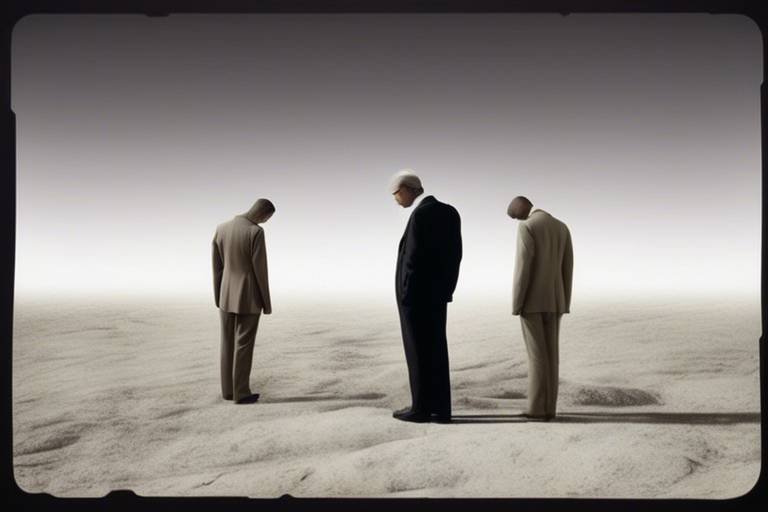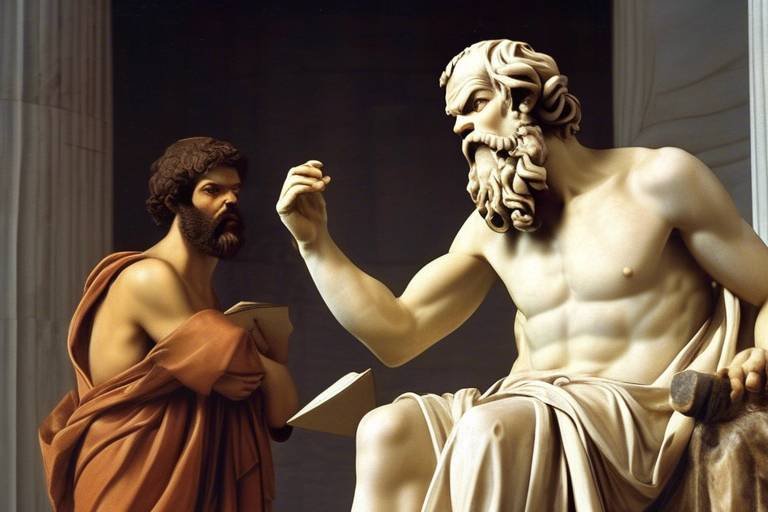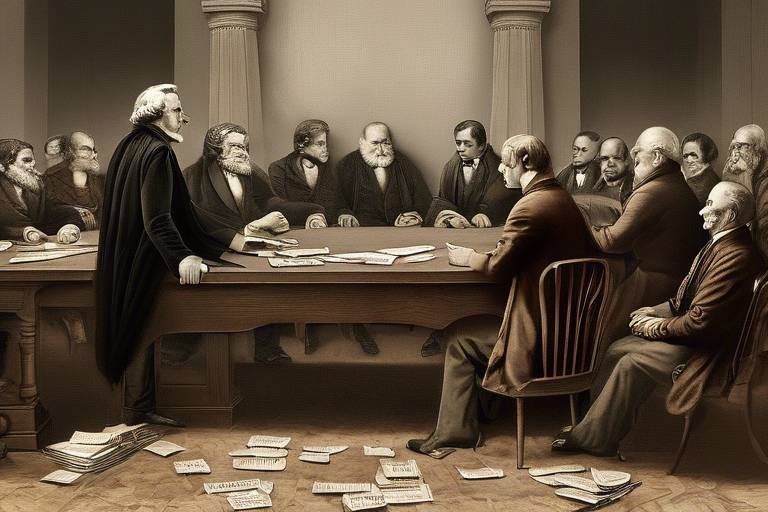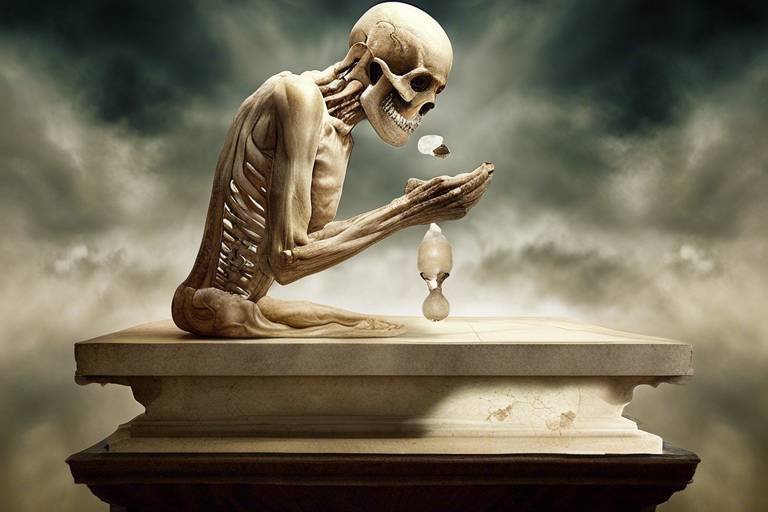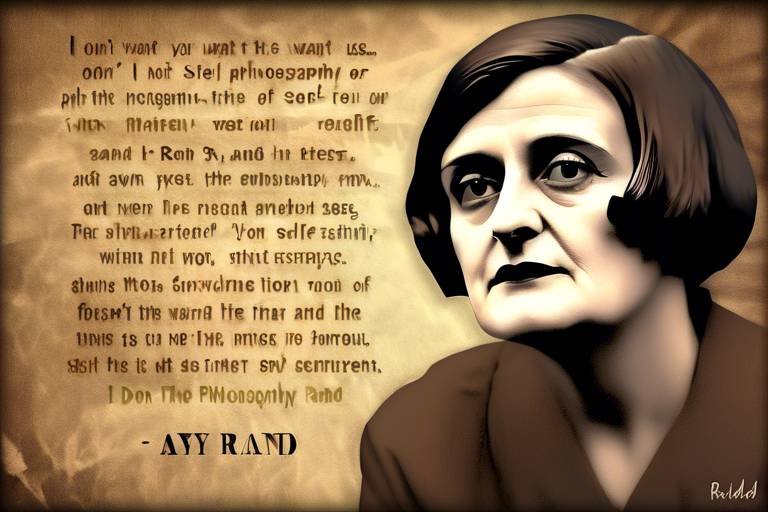Nietzsche on Morality - A Modern Interpretation
Friedrich Nietzsche, a name that reverberates through the corridors of philosophical thought, had a unique and often controversial take on morality. His ideas challenge the very fabric of traditional ethical systems, prompting us to re-evaluate our understanding of right and wrong. In today's world, where moral relativism and individualism are increasingly prevalent, Nietzsche's insights are not just relevant—they are essential. Imagine a world where morality isn't a rigid set of rules imposed from above, but a dynamic interplay of individual values shaped by personal experiences and societal contexts. This article dives deep into Nietzsche's views on morality, exploring how they resonate in contemporary society and impact philosophical discourse.
At the heart of Nietzsche's ethical philosophy lies a profound challenge to conventional moral values. He argues for a radical re-evaluation of morality, one that emphasizes individualism and personal responsibility. Nietzsche believes that traditional moral systems, often rooted in religious or societal norms, stifle human potential and creativity. Instead, he advocates for a morality that is fluid, adaptable, and deeply personal. This perspective encourages individuals to forge their own paths, to question the status quo, and to define their own values based on their unique experiences and aspirations.
Central to Nietzsche's moral philosophy is the distinction between what he terms master morality and slave morality. These concepts serve as a lens through which we can understand the power dynamics and moral perspectives that shape our society. Master morality, characterized by values such as strength, creativity, and nobility, represents the moral framework of the powerful and assertive individuals who shape their own destinies. In contrast, slave morality emerges from the oppressed, marked by values like humility, compassion, and meekness. Understanding these two moralities is crucial for grasping Nietzsche's critique of societal norms and the implications for ethical thought.
Master morality is defined by its celebration of life, power, and achievement. Those who embody this ethical stance view themselves as creators of values, not merely followers of imposed rules. They embrace traits such as:
- Strength: The ability to assert oneself and influence the world.
- Creativity: The capacity to innovate and redefine norms.
- Nobility: A sense of honor and integrity in one's pursuits.
This moral perspective fosters a worldview that encourages individuals to pursue their passions and ambitions without guilt or fear of judgment. It’s about living authentically and embracing one’s potential, akin to a lion roaring in the savannah, unencumbered by the expectations of the herd.
Power is a fundamental aspect of master morality. It shapes not only the values of those who embody this ethical stance but also their actions and decisions. Nietzsche suggests that power dynamics are intrinsic to human relationships and societal structures. The powerful, in their pursuit of greatness, create new values that reflect their strengths and aspirations. This relationship between power and moral judgment is crucial; it challenges us to consider how our own values are influenced by the power structures around us. Are we merely conforming to societal expectations, or are we actively shaping our moral landscape?
In stark contrast, slave morality arises from the resentment of the weak. It is characterized by values that prioritize humility, compassion, and self-denial. While these traits may seem virtuous on the surface, Nietzsche critiques their implications for personal agency and societal structures. He argues that slave morality can lead to a culture of mediocrity, where individuals are discouraged from realizing their full potential in favor of conformity and submission. This critique invites us to reflect on whether our own moral beliefs are genuinely our own or a product of societal conditioning.
Slave morality is fundamentally reactive; it emerges as a response to the oppression and suffering experienced by the weak. It often glorifies traits that diminish individual strength and creativity, such as:
- Meekness: A tendency to submit to authority and societal norms.
- Compassion: While valuable, it can sometimes be wielded as a tool for control.
- Humility: The notion that one’s worth is diminished in comparison to others.
This moral framework can shape societal norms in ways that discourage personal ambition and foster a culture of compliance. Nietzsche challenges us to question whether these values truly serve our best interests or simply perpetuate a cycle of oppression.
Nietzsche introduces the concept of the will to power as a fundamental driving force behind human behavior. This principle redefines morality and individual motivation, suggesting that our actions are not merely guided by a desire for survival or social acceptance, but by an inherent drive to assert and enhance our power and influence. The will to power encourages individuals to strive for greatness, to push boundaries, and to seek out new experiences that enrich their lives and the lives of others.
The implications of the will to power extend beyond personal ambitions; they also shape social interactions and collective ethics. When individuals embrace this principle, they contribute to a dynamic society that values innovation, creativity, and personal growth. This perspective invites us to reconsider our roles within our communities and to recognize the potential for positive change that arises when we harness our innate desires for power and achievement.
Nietzsche's critique of conventional moral systems reveals their limitations and contradictions. He challenges the notion that there is a universal morality applicable to all people at all times. Instead, he advocates for a departure from rigid moral codes in favor of more fluid ethical perspectives that reflect the complexities of human experience. This critique encourages us to embrace a more nuanced understanding of morality, one that recognizes the diversity of human values and the importance of context in ethical decision-making.
Ultimately, Nietzsche's philosophy emphasizes the importance of questioning established moral values. He encourages us to reflect on our own beliefs and ethical frameworks, challenging us to consider whether they genuinely align with our individual experiences and aspirations. In a world that often imposes rigid moral structures, Nietzsche's insights invite us to embrace a more personalized and dynamic approach to morality, one that celebrates the richness of human experience and the potential for personal growth.
- What is master morality? Master morality is a moral framework defined by values such as strength, creativity, and power, typically associated with those who are assertive and influential.
- What is slave morality? Slave morality arises from the perspective of the oppressed and is characterized by values like humility, compassion, and meekness.
- How does Nietzsche view traditional morality? Nietzsche critiques traditional morality as rigid and limiting, advocating instead for a more fluid and individualistic approach to ethics.
- What is the will to power? The will to power is a fundamental concept in Nietzsche's philosophy, suggesting that the primary driving force behind human behavior is the desire to assert and enhance one's power and influence.
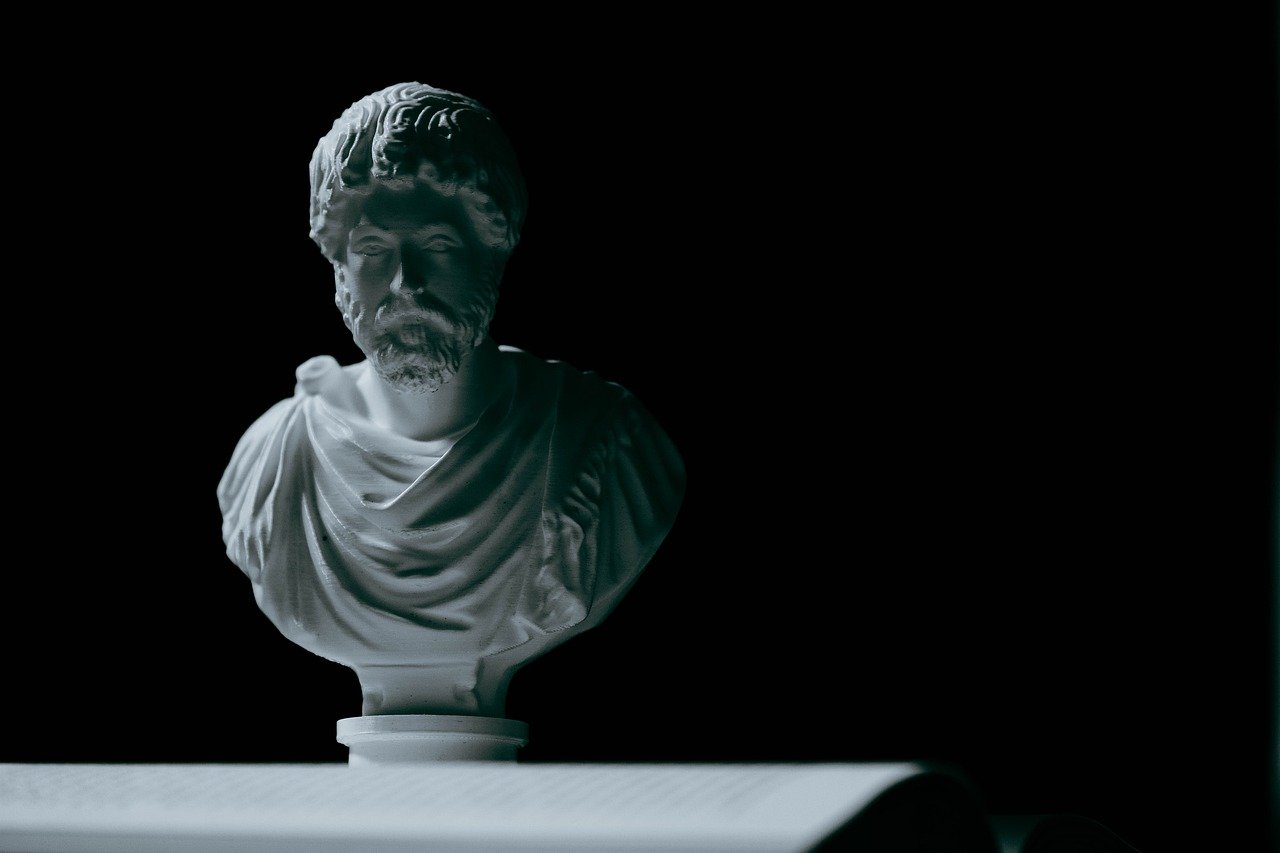
Understanding Nietzsche's Ethical Framework
Friedrich Nietzsche's ethical framework is nothing short of revolutionary, challenging the very foundations of traditional morality. At its core, Nietzsche advocates for a re-evaluation of moral values, urging individuals to embrace their own instincts and desires rather than adhering to societal norms that often stifle personal growth. His philosophy is steeped in the idea of individualism and personal responsibility, suggesting that morality should not be a one-size-fits-all approach dictated by external forces.
Nietzsche believed that conventional moral systems tend to promote mediocrity and conformity, leading to a society where the strong are often held back by the weak. In his view, true morality is not about following rules but about the expression of one's will and the pursuit of greatness. He famously stated, "Morality is the herd instinct in the individual," highlighting how traditional ethics can suppress the unique qualities that make us human.
Through his concept of the Übermensch or "Overman," Nietzsche invites us to transcend the limitations imposed by societal expectations. This ideal individual embodies creativity, strength, and a profound sense of self, living life according to their own values rather than those imposed by the masses. Nietzsche's ethical framework is not merely philosophical; it is a call to action, encouraging individuals to forge their own paths and take ownership of their moral choices.
Furthermore, Nietzsche's approach emphasizes the importance of self-reflection. He challenges us to question our own beliefs and the origins of our moral values. Are they genuinely our own, or are they inherited from society? This line of questioning can lead to a more authentic existence, where individuals live in accordance with their true selves rather than mere imitations of others.
In essence, Nietzsche's ethical framework is a powerful reminder that morality is not static but rather a dynamic and evolving concept. It requires us to engage actively with our beliefs and to be willing to challenge the status quo. By embracing this philosophy, we can cultivate a deeper understanding of ourselves and the world around us, ultimately leading to a more fulfilling and meaningful life.

The Concept of Master and Slave Morality
Friedrich Nietzsche's exploration of morality is not just an academic exercise; it’s a radical rethinking of how we understand ethical frameworks in society. At the heart of his philosophy lies the profound distinction between master morality and slave morality. These concepts serve as a lens through which we can examine the power dynamics that shape our moral beliefs and societal norms. By dissecting these two forms of morality, we can better understand the motivations behind human behavior and the implications of our ethical choices.
Master morality, as Nietzsche describes, is rooted in the values of the noble individual. This type of morality celebrates traits such as strength, creativity, and assertiveness. Imagine a lion, proud and powerful, roaming its territory with confidence. This is the essence of master morality—it's about embracing one's instincts and asserting one's will. The noble individual does not shy away from their desires or ambitions; instead, they embody a life-affirming philosophy that encourages personal growth and self-actualization.
On the flip side, we have slave morality, which emerges from the perspective of the oppressed. This morality is characterized by values such as humility, compassion, and a sense of community. Picture a flock of sheep, huddled together for safety. While this collective approach fosters a sense of belonging, it often comes at the cost of individual ambition and strength. Slave morality arises from a place of resentment and weakness, advocating for values that serve to subdue the dominant forces in society rather than challenge them. This can lead to a moral framework that stifles personal agency and promotes conformity.
The significance of these moral categories extends beyond individual behavior; they reflect broader societal structures and power dynamics. For instance, in a society dominated by slave morality, the values of the strong may be demonized, while the traits of the weak are exalted. This dynamic creates a moral landscape where power is viewed with suspicion, and the virtues of the noble individual are often suppressed. Conversely, a society that embraces master morality may celebrate ambition and strength, fostering an environment where individuals are encouraged to pursue greatness.
To illustrate the contrast between these two moralities, consider the following table:
| Aspect | Master Morality | Slave Morality |
|---|---|---|
| Source of Values | Strength and nobility | Resentment and oppression |
| Key Traits | Creativity, assertiveness | Humility, compassion |
| Worldview | Life-affirming | Life-denying |
| Impact on Society | Encourages individualism | Promotes collectivism |
Ultimately, Nietzsche's examination of master and slave morality compels us to reflect on our own ethical beliefs. Are we shaped more by the values of the strong, or do we find ourselves aligning with the perspectives of the oppressed? By understanding these moral frameworks, we can begin to question the societal norms that influence our behavior and reconsider the values we choose to uphold.
- What is the difference between master and slave morality?
Master morality values strength and creativity, while slave morality is rooted in humility and compassion. - How do these moralities affect society?
Master morality promotes individualism and ambition, whereas slave morality encourages collectivism and conformity. - Can individuals embody both moralities?
Yes, individuals may exhibit traits from both moral frameworks depending on their circumstances and experiences.

Master Morality Explained
Master morality is a fascinating concept introduced by Friedrich Nietzsche, representing a value system that is inherently different from the more commonly understood slave morality. At its core, master morality is characterized by a celebration of qualities such as strength, creativity, and nobility. These traits not only define the moral compass of the noble individual but also shape their worldview, allowing them to embrace life with vigor and assertiveness. Imagine a lion, standing tall and proud, embodying the essence of power and confidence—this is the spirit of master morality.
In essence, individuals who subscribe to master morality view themselves as creators of values rather than followers of pre-established norms. They believe in the idea of self-overcoming, constantly striving to transcend their limitations and achieve greatness. This approach to life encourages a sense of personal responsibility, where one's actions are driven by a desire to assert one's will and express one's individuality. Unlike the reactive nature of slave morality, which often seeks validation through adherence to external standards, master morality is inherently proactive and self-determined.
To further illustrate the distinction, consider the following attributes that define master morality:
- Affirmation of Life: Master morality embraces life's challenges and joys, viewing them as opportunities for growth.
- Individualism: It prioritizes personal agency and the unique perspective of the individual over collective norms.
- Creativity: Master morality fosters innovation and originality, encouraging individuals to create their own values.
Moreover, the role of power in master morality cannot be overstated. Power is not merely a tool for domination; it is a fundamental aspect of one's moral judgment. Those who embody master morality often see power as a means of expression, a way to assert their will in the world. They recognize that true strength lies not just in physical prowess but also in the ability to influence and inspire others. This perspective fosters a dynamic interplay between power and ethics, where moral actions are often evaluated based on their impact and the strength of character behind them.
In conclusion, master morality offers a compelling framework for understanding human behavior and ethical considerations. By prioritizing strength, creativity, and individualism, it challenges us to rethink our own moral values and encourages us to embrace a more robust, life-affirming approach to existence. As we navigate the complexities of our modern world, reflecting on the principles of master morality may empower us to live more authentically and purposefully.
- What is master morality? Master morality is a value system that emphasizes strength, creativity, and individualism, contrasting with slave morality, which is characterized by humility and compassion.
- How does power relate to master morality? Power is central to master morality as it shapes the values and actions of individuals who embody this ethical stance, promoting a proactive and assertive approach to life.
- Can master morality coexist with modern ethical frameworks? Yes, many contemporary ethical discussions can benefit from the insights of master morality, encouraging individuals to challenge established norms and create their own values.

noble
This article explores Friedrich Nietzsche's views on morality, examining their relevance and implications in contemporary society, as well as their impact on philosophical discourse and ethical frameworks.
Nietzsche's approach to ethics challenges traditional moral values, advocating for a re-evaluation of morality that emphasizes individualism and personal responsibility. This section delves into the foundations of his ethical philosophy.
Central to Nietzsche's moral philosophy is the distinction between master and slave morality. This section explains these concepts and their significance in understanding power dynamics and moral perspectives in society.
Master morality is characterized by values such as strength, creativity, and nobility. This subsection analyzes how these traits define the moral compass of the individual and their worldview.
Power plays a crucial role in master morality, as it shapes the values and actions of individuals who embody this ethical stance. This section examines the relationship between power and moral judgment.
Slave morality arises from the oppressed and is marked by values such as humility and compassion. This subsection critiques its implications for personal agency and societal structures.
Slave morality, in contrast, arises from the resentment of the weak. This section discusses its characteristics and how it influences societal norms and collective ethics.
Nietzsche introduces the concept of the will to power as a driving force behind human behavior. This section explores how this principle redefines morality and individual motivation.
The will to power not only influences personal ambitions but also shapes social interactions. This subsection investigates its broader implications for ethics and societal development.
Nietzsche's critique of conventional moral systems reveals their limitations and contradictions. This section discusses how his philosophy encourages a departure from rigid moral codes in favor of more fluid ethical perspectives.
This subsection emphasizes the importance of questioning established moral values and encourages readers to reflect on their own beliefs and ethical frameworks in light of Nietzsche's insights.
In Nietzsche's framework, the term embodies a unique set of characteristics that define an ideal moral individual. Nobility is not merely a matter of social rank or wealth; instead, it is deeply rooted in one's inner strength, creativity, and the ability to assert oneself in the world. The noble individual embraces life with vigor and passion, viewing existence as an opportunity for self-expression and growth. They are not constrained by societal norms or the expectations of others; rather, they forge their own path, guided by their instincts and ambitions.
Nobility, in this sense, is about the cultivation of virtues that elevate one's existence. These virtues include:
- Strength: The noble person exhibits physical and mental fortitude, facing challenges head-on.
- Creativity: They possess a unique ability to innovate and think outside the box, contributing to the richness of human culture.
- Leadership: Nobility involves guiding others, inspiring them through action and vision rather than coercion.
This perspective on nobility is crucial because it challenges the conventional understanding of morality, which often equates goodness with meekness or submission. Instead, Nietzsche invites us to reconsider what it means to lead a moral life. The noble individual does not shy away from power; they embrace it and use it to enhance their own life and the lives of those around them. This active engagement with power fosters a sense of responsibility and purpose, as the noble person understands that their actions have consequences.
Ultimately, the concept of the noble individual serves as a call to arms for anyone seeking to live authentically and meaningfully. It encourages a rejection of passive acceptance of societal norms and instead champions a life lived with intention and courage. By embodying these noble traits, individuals can challenge the status quo and contribute to a more dynamic and vibrant society.
- What is Nietzsche's view on morality?
Nietzsche believed that traditional moral values often suppress individuality and creativity. He advocated for a re-evaluation of morality based on personal strength and responsibility. - What is master morality?
Master morality is characterized by values such as strength, creativity, and nobility, focusing on the individual's ability to assert their will and shape their own destiny. - How does slave morality differ from master morality?
Slave morality arises from the oppressed and emphasizes humility and compassion, often viewing strength as a threat. In contrast, master morality celebrates power and self-assertion. - What is the will to power?
The will to power is a fundamental concept in Nietzsche's philosophy, suggesting that the primary driving force in humans is the desire to assert and enhance one's own existence.

individual and their worldview.
This article explores Friedrich Nietzsche's views on morality, examining their relevance and implications in contemporary society, as well as their impact on philosophical discourse and ethical frameworks.
Nietzsche's approach to ethics challenges traditional moral values, advocating for a re-evaluation of morality that emphasizes individualism and personal responsibility. This section delves into the foundations of his ethical philosophy.
Central to Nietzsche's moral philosophy is the distinction between master and slave morality. This section explains these concepts and their significance in understanding power dynamics and moral perspectives in society.
Master morality is characterized by values such as strength, creativity, and nobility. This subsection analyzes how these traits define the moral compass of the noble individual and their worldview.
Power plays a crucial role in master morality, as it shapes the values and actions of individuals who embody this ethical stance. This section examines the relationship between power and moral judgment.
Slave morality arises from the oppressed and is marked by values such as humility and compassion. This subsection critiques its implications for personal agency and societal structures.
Slave morality, in contrast, arises from the resentment of the weak. This section discusses its characteristics and how it influences societal norms and collective ethics.
Nietzsche introduces the concept of the will to power as a driving force behind human behavior. This section explores how this principle redefines morality and individual motivation.
The will to power not only influences personal ambitions but also shapes social interactions. This subsection investigates its broader implications for ethics and societal development.
Nietzsche's critique of conventional moral systems reveals their limitations and contradictions. This section discusses how his philosophy encourages a departure from rigid moral codes in favor of more fluid ethical perspectives.
This subsection emphasizes the importance of questioning established moral values and encourages readers to reflect on their own beliefs and ethical frameworks in light of Nietzsche's insights.
Master morality is not merely a set of values; it is a worldview that defines how individuals perceive their place in the world. Those who embody master morality often see themselves as creators of their own values, thriving on strength, ambition, and a sense of purpose. In this worldview, life is viewed as a canvas, and the individual is the artist, free to paint their own moral landscape without the constraints imposed by societal norms.
For instance, consider how a master moralist approaches challenges. Instead of viewing obstacles as threats, they see them as opportunities for growth and self-assertion. This perspective fosters a resilient mindset, encouraging individuals to embrace their desires and ambitions. They are not bound by the expectations of others; instead, they forge their paths based on personal aspirations and strengths.
Furthermore, the master moralist often holds a belief in the inherent value of power and achievement. This worldview is not about domination for its own sake but rather about the celebration of life and the affirmation of one's existence through accomplishments. In this sense, power becomes a means of self-expression, a way to manifest one's potential and creativity.
In contrast, those who subscribe to slave morality might view the world through a lens of limitation and resentment. They may feel oppressed by the successes of others and respond with values that promote equality and humility as a means of coping with their own perceived inadequacies. This dichotomy not only shapes individual behavior but also influences broader societal norms, often leading to a clash between those who seek to elevate themselves and those who advocate for collective well-being.
Ultimately, the distinction between master and slave morality offers profound insights into the human condition. It challenges us to reflect on our own moral beliefs and consider how they shape our actions and interactions. Are we creators of our values, or do we allow external forces to dictate our moral compass? Nietzsche's philosophy invites us to explore these questions and, in doing so, to embrace a more authentic existence.
- What is the main difference between master and slave morality? Master morality values strength and creativity, while slave morality emphasizes humility and compassion.
- How does Nietzsche's philosophy apply to modern ethics? Nietzsche encourages individuals to question traditional moral codes and adopt a more fluid approach to ethics.
- What role does the will to power play in human behavior? The will to power is seen as a fundamental driving force behind human motivations and ambitions.

The Role of Power in Master Morality
Power is not just a buzzword in Nietzsche's philosophy; it is the very essence that shapes the landscape of master morality. To understand this, we must dive deep into how power operates within the framework of moral values championed by the noble individual. In Nietzsche's view, those who embody master morality do so by embracing their strength, creativity, and nobility, which, in turn, allows them to assert their will upon the world. Think of it like a lion in the wild, confident and unyielding, as opposed to a gazelle that must constantly be on guard. This analogy highlights the essence of power: it is not merely about domination but about the ability to create and define one's own values.
At the core of master morality is the belief that individuals should not shy away from their instincts or desires. Instead, they should harness their power to shape their destinies. This leads to a moral framework that is fluid and dynamic, allowing for personal growth and the pursuit of greatness. In contrast to the rigidity of traditional moral codes, which often suppress individuality, master morality encourages individuals to rise above societal expectations and define their own paths. This is where the role of power becomes critical; it propels individuals to challenge the status quo, to innovate, and to lead.
However, it is essential to recognize that the relationship between power and morality is complex. Power can corrupt, and Nietzsche was acutely aware of this potential. He warned against the dangers of unbridled power that lacks accountability. The noble individual must balance their strength with wisdom and responsibility, ensuring that their pursuit of power does not lead to tyranny or oppression. This intricate dance between power and morality is what makes Nietzsche's philosophy both compelling and cautionary.
To further illustrate this dynamic, let’s consider the following points:
- Empowerment vs. Oppression: Master morality empowers individuals to assert themselves, whereas slave morality often arises in response to oppression.
- Creativity and Innovation: The noble individual uses their power to innovate and create, fostering a culture of progress rather than stagnation.
- Responsibility: With great power comes great responsibility; the master must wield their power wisely to avoid moral pitfalls.
In conclusion, the role of power in master morality is pivotal. It not only defines the moral compass of the noble individual but also challenges societal norms and expectations. By understanding and embracing their power, individuals can transcend traditional moral limitations, paving the way for a more authentic and self-determined existence.
- What is master morality? Master morality is a concept introduced by Nietzsche that emphasizes values such as strength, creativity, and nobility, allowing individuals to define their own moral compass.
- How does power influence morality? Power influences morality by enabling individuals to assert their will and shape their values, leading to a more dynamic and fluid ethical framework.
- What are the dangers of power in morality? The dangers of power in morality include the potential for corruption and tyranny, emphasizing the need for responsibility and wisdom in its use.

Critique of Slave Morality
Friedrich Nietzsche's critique of slave morality is a profound examination of how values arise from the experiences and perspectives of the oppressed. At its core, slave morality is rooted in a sense of resentment and a reaction against the dominant values of the powerful. Nietzsche argues that this moral framework, while seemingly virtuous, often leads to a denial of the individual's potential and a suppression of natural instincts. Instead of celebrating strength and creativity, slave morality promotes values such as humility, meekness, and compassion, which can inadvertently stifle personal growth and ambition.
One of the key aspects of slave morality is its tendency to promote a sense of victimhood. This perspective can create an environment where individuals feel justified in their grievances, yet it may also lead to a lack of personal agency. By continually focusing on the injustices they face, individuals adhering to slave morality may find themselves trapped in a cycle of blame and passivity. Nietzsche suggests that this mindset not only hampers personal development but also perpetuates societal structures that favor weakness over strength. In essence, it becomes a self-fulfilling prophecy where the oppressed remain oppressed due to their own moral framework.
Moreover, Nietzsche raises an important question: does slave morality truly serve the interests of those it claims to protect? By glorifying traits such as compassion and humility, it risks undermining the very essence of what it means to be human. Instead of encouraging individuals to strive for greatness and assert their will, it often leads to mediocrity and conformity. This critique invites us to consider whether the values we hold dear are genuinely beneficial or simply a reflection of our historical context.
It's also worth noting that Nietzsche does not dismiss the importance of empathy and compassion entirely; rather, he challenges us to reconsider their place within a broader ethical framework. He advocates for a balance between the virtues of master morality—strength, creativity, and assertiveness—and the more subdued values of slave morality. This balance encourages individuals to embrace their full potential while remaining aware of their responsibilities to others.
In conclusion, Nietzsche's critique of slave morality serves as a powerful reminder to question the values we adopt. Are they truly ours, or are they imposed by societal norms? By exploring this critique, we can better understand the dynamics of power, ethics, and personal responsibility. It encourages a re-evaluation of our moral beliefs, urging us to seek a more authentic and empowered existence.
- What is slave morality according to Nietzsche? Slave morality is a moral framework that arises from the experiences of the oppressed, characterized by values such as humility, meekness, and compassion.
- Why does Nietzsche criticize slave morality? Nietzsche critiques slave morality for promoting a sense of victimhood and denying individuals the chance to realize their full potential, ultimately leading to mediocrity.
- How does slave morality affect personal agency? By focusing on grievances and injustices, slave morality can trap individuals in a cycle of blame and passivity, hindering personal growth and ambition.
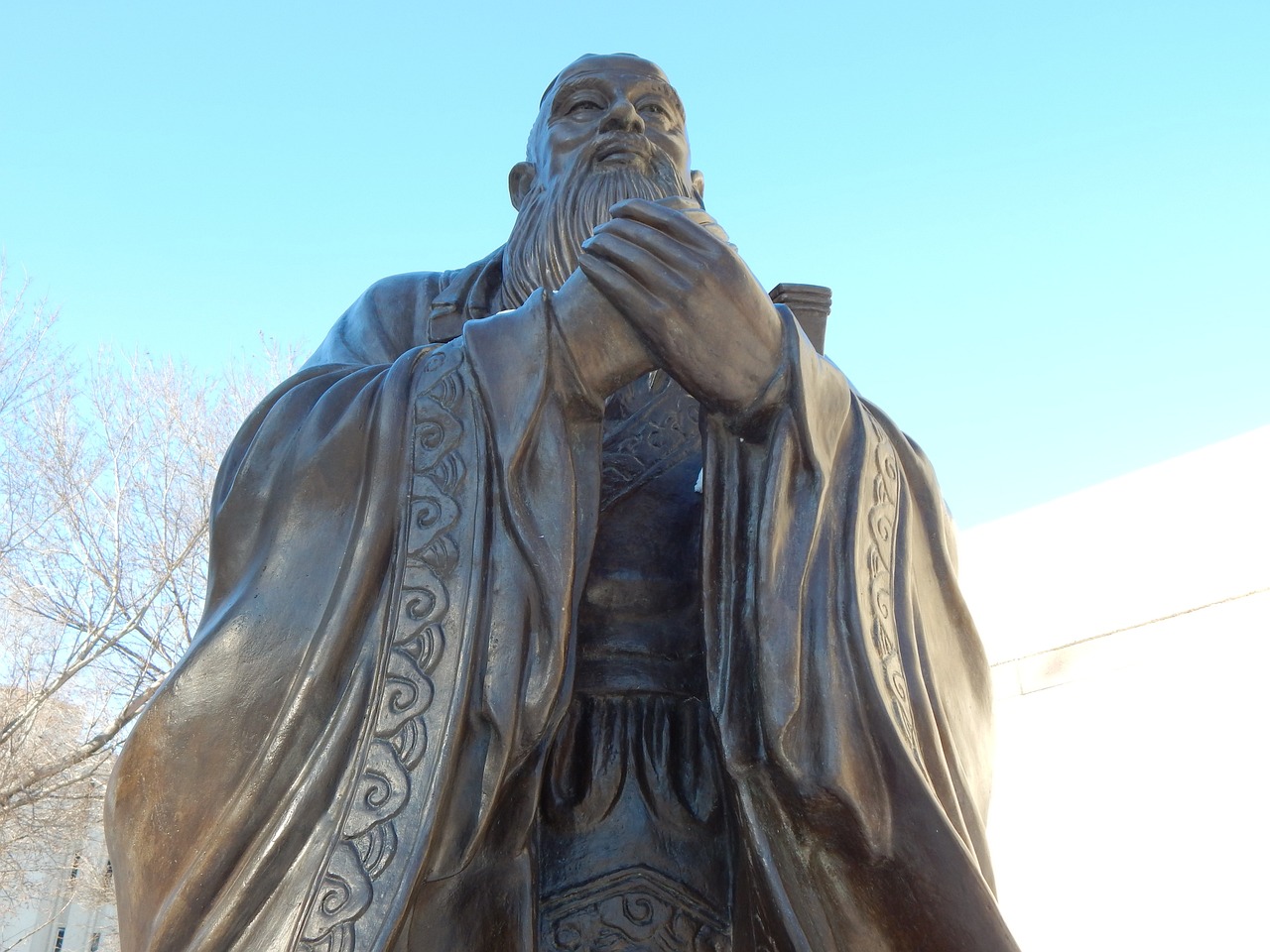
Slave Morality Explained
When we talk about slave morality, we're diving into a concept that Friedrich Nietzsche articulated with both clarity and depth. This form of morality emerges from the resentment and oppression experienced by the weaker members of society. Unlike master morality, which celebrates strength and power, slave morality is characterized by values that promote humility, compassion, and meekness. But what does this really mean for us today? Well, it’s about understanding how these values shape not only individual behavior but also societal norms.
At its core, slave morality is a reaction against the dominance of master morality. It arises from those who feel powerless and, in many ways, seeks to undermine the very foundations of strength and nobility that master morality upholds. Think of it like a defensive strategy; when you can’t compete with strength, you create a moral framework that values the traits you possess—traits like kindness and empathy. This shift in values helps to create a sense of community and belonging among the oppressed, but it can also lead to a kind of moral inversion, where the traits of the weak are elevated above those of the strong.
One significant aspect of slave morality is its tendency to promote a collective identity over individual achievement. This can be seen in various social movements and ideologies that advocate for the rights of the marginalized. While this can foster solidarity, it may also stifle individualism and personal responsibility. After all, if everyone is expected to conform to a set of moral standards that prioritize the group's needs over personal ambition, where does that leave the individual?
Moreover, slave morality often manifests in societal structures that reward compliance and discourage dissent. For instance, consider how certain cultures may celebrate self-sacrifice and altruism, sometimes at the expense of personal growth and ambition. While these values can promote a sense of community, they can also create a culture where mediocrity is celebrated, and exceptionalism is viewed with suspicion. This can lead to a paradox where the very traits that are supposed to uplift society might actually hold it back.
To illustrate the impact of slave morality, let's look at a few characteristics that define it:
- Compassion: A strong emphasis on empathy and caring for others, often at the cost of one's own needs.
- Humility: The valorization of modesty and self-effacement, which can discourage assertiveness and ambition.
- Resentment: A feeling that can fuel a moral code that seeks to undermine those who are perceived as oppressors.
In summary, slave morality is a complex and multifaceted concept that challenges us to think critically about the values we hold and the societal structures that shape our ethics. It invites us to question whether the traits we celebrate truly serve our individual and collective well-being or if they simply perpetuate a cycle of oppression and mediocrity. Understanding slave morality is not just an academic exercise; it is a vital part of navigating the ethical landscape of our modern world.
- What is the primary difference between master and slave morality? Master morality values strength and creativity, while slave morality emphasizes humility and compassion.
- How does slave morality affect societal norms? It can promote conformity and discourage individualism, leading to a culture that may undervalue exceptionalism.
- Can slave morality be beneficial? Yes, it fosters community and support among the oppressed, but it can also limit personal growth and ambition.

The Will to Power as a Moral Principle
Friedrich Nietzsche's concept of the will to power is a cornerstone of his philosophical framework, serving as a fundamental driving force behind human behavior. Unlike traditional notions of morality that often emphasize altruism and self-denial, Nietzsche posits that the will to power is an expression of our innate desire to assert and enhance our existence. This principle goes beyond mere survival; it encapsulates the ambition to grow, to dominate, and to shape one’s own destiny. In essence, the will to power is about self-overcoming and the pursuit of personal excellence.
At its core, the will to power suggests that every action we take is motivated by a desire to exert influence and achieve mastery over our circumstances. This perspective radically redefines morality, shifting the focus from adherence to societal norms to the individual's quest for fulfillment and strength. For Nietzsche, morality is not a universal standard but rather a personal journey that varies from one individual to another. This idea challenges us to reconsider our motivations and the ethical frameworks we operate within.
Furthermore, the implications of the will to power extend beyond personal ambition. It shapes social interactions and influences the structures of society itself. When individuals embrace their will to power, they engage in a dynamic interplay of relationships that can lead to both conflict and creativity. This principle can be illustrated through various aspects of life, including:
- Leadership: Those who embody the will to power often emerge as leaders, inspiring others to follow their vision and assert their own strengths.
- Artistic Expression: Artists who channel their will to power create works that challenge conventions and push boundaries, reflecting their inner drive for greatness.
- Personal Relationships: Interpersonal dynamics are influenced by the will to power, as individuals navigate their desires for influence, control, and connection.
In practical terms, embracing the will to power means recognizing that our actions are often driven by deeper motivations than we might initially acknowledge. It invites us to explore our desires, confront our fears, and ultimately take responsibility for our choices. This self-awareness can lead to a more authentic existence, where individuals no longer feel constrained by external moral codes but instead forge their own paths based on personal values and aspirations.
However, it's essential to note that Nietzsche's concept is not an endorsement of tyranny or oppression. The will to power is meant to be a transformative force that encourages individuals to rise above mediocrity, not to subjugate others. In this light, the will to power becomes a call to action, urging us to cultivate our strengths and use them to contribute positively to society.
In conclusion, the will to power as a moral principle invites a profound re-evaluation of how we perceive ethics and personal motivation. It challenges us to break free from the shackles of conventional morality and embrace a more fluid, dynamic approach to our values and actions. By understanding and harnessing the will to power, we can embark on a journey of self-discovery and empowerment that resonates deeply within our contemporary lives.
- What is the will to power?
- The will to power is a philosophical concept introduced by Nietzsche, representing the fundamental drive to assert and enhance one's existence and influence.
- How does the will to power affect morality?
- It redefines morality by shifting the focus from societal norms to personal ambition and self-overcoming, encouraging individuals to create their own values.
- Is the will to power a form of selfishness?
- While it emphasizes individual strength and ambition, it is not inherently selfish; it encourages personal growth and positive contributions to society.
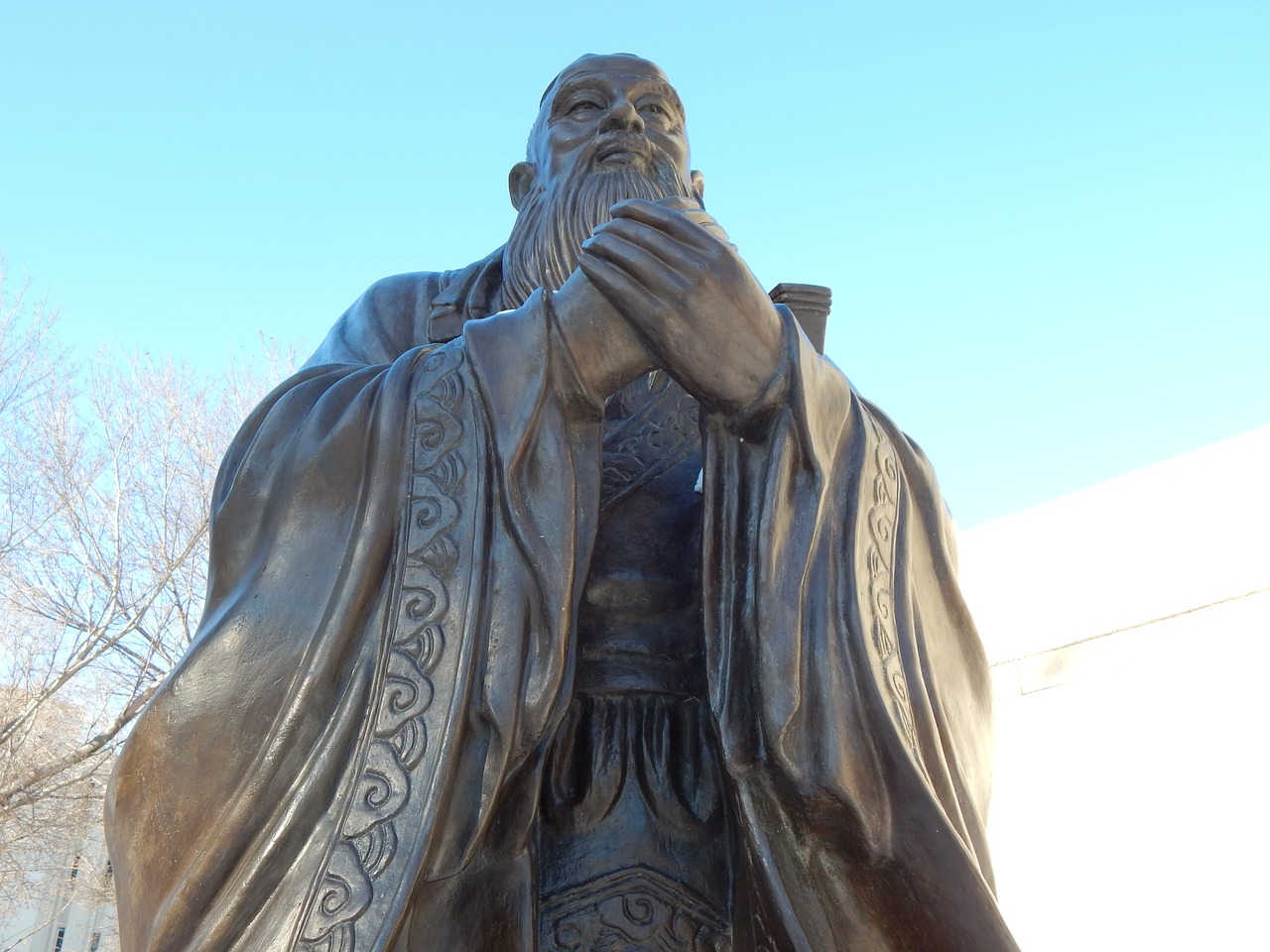
will to power
This article explores Friedrich Nietzsche's views on morality, examining their relevance and implications in contemporary society, as well as their impact on philosophical discourse and ethical frameworks.
Nietzsche's approach to ethics challenges traditional moral values, advocating for a re-evaluation of morality that emphasizes individualism and personal responsibility. This section delves into the foundations of his ethical philosophy.
Central to Nietzsche's moral philosophy is the distinction between master and slave morality. This section explains these concepts and their significance in understanding power dynamics and moral perspectives in society.
Master morality is characterized by values such as strength, creativity, and nobility. This subsection analyzes how these traits define the moral compass of the noble individual and their worldview.
Power plays a crucial role in master morality, as it shapes the values and actions of individuals who embody this ethical stance. This section examines the relationship between power and moral judgment.
Slave morality arises from the oppressed and is marked by values such as humility and compassion. This subsection critiques its implications for personal agency and societal structures.
Slave morality, in contrast, arises from the resentment of the weak. This section discusses its characteristics and how it influences societal norms and collective ethics.
Nietzsche introduces the concept of the as a driving force behind human behavior. This principle suggests that at the core of human motivation lies a fundamental desire not just to survive but to assert and enhance one's influence and strength. In this context, the will to power transcends mere ambition; it embodies a profound drive to shape the world according to one's vision. When we consider the will to power, it’s essential to recognize that it isn't merely about domination over others but rather about self-overcoming and personal growth. Nietzsche believed that this force is inherent in all individuals and manifests in various aspects of life, from personal relationships to artistic expression.
The will to power not only influences personal ambitions but also shapes social interactions. It serves as a lens through which we can view the motivations behind human actions and societal structures. For instance, in a competitive environment, individuals may strive to assert their dominance, leading to innovation and progress. Conversely, this same drive can result in conflict if not tempered by awareness and empathy. The implications of the will to power extend to various domains, including politics, art, and personal relationships, challenging us to reconsider how we engage with one another and the world around us. By embracing this principle, we can foster a more dynamic and fluid understanding of ethics, moving away from rigid moral codes that often stifle creativity and individuality.
Nietzsche's critique of conventional moral systems reveals their limitations and contradictions. This section discusses how his philosophy encourages a departure from rigid moral codes in favor of more fluid ethical perspectives.
This subsection emphasizes the importance of questioning established moral values and encourages readers to reflect on their own beliefs and ethical frameworks in light of Nietzsche's insights.
- What is Nietzsche's view on morality?
Nietzsche believes that morality should be re-evaluated, emphasizing individualism and the will to power rather than adhering to traditional moral values. - What are master and slave moralities?
Master morality values strength and creativity, while slave morality values humility and compassion, often arising from the oppressed. - How does the will to power influence society?
The will to power drives individuals to assert their influence, shaping personal ambitions and social interactions. - Why should we question traditional moral values?
Questioning traditional values allows for personal growth and a more nuanced understanding of ethics that reflects individual experiences.

as a driving force behind human behavior. This section explores how this principle redefines morality and individual motivation.
Friedrich Nietzsche's concept of the will to power serves as a profound lens through which we can examine human behavior and morality. Essentially, this principle posits that the fundamental driving force behind human actions is not merely a quest for survival or pleasure, but rather an intrinsic desire to assert and enhance one's own power. This assertion of power can manifest in various forms, including the pursuit of knowledge, creative expression, and the establishment of social influence. Nietzsche believed that recognizing this underlying motivation could lead to a significant re-evaluation of our moral frameworks.
Imagine for a moment that life is akin to a grand stage, where each individual is both an actor and a director. The will to power is the script that guides these performances, influencing the choices we make and the roles we adopt. Rather than adhering strictly to societal norms or traditional moral codes, individuals are encouraged to embrace their inherent drive for self-overcoming and personal growth. This shift in perspective not only redefines what it means to be moral but also elevates personal responsibility. When we acknowledge the will to power, we begin to understand that morality is not a fixed set of rules but rather a dynamic interplay of personal values and aspirations.
Moreover, the implications of the will to power extend beyond the individual. In social contexts, this principle can illuminate the complexities of human relationships and interactions. For instance, when people engage in competition, whether in business, art, or even personal relationships, they are often driven by their will to power. This drive can lead to innovation and progress, but it can also foster conflicts and ethical dilemmas. Understanding this duality is crucial for navigating the moral landscape of contemporary society.
To illustrate how the will to power redefines morality and individual motivation, consider the following table that contrasts traditional moral values with those inspired by Nietzsche’s philosophy:
| Traditional Morality | Nietzschean Morality |
|---|---|
| Focus on altruism and selflessness | Emphasis on individual strength and creativity |
| Adherence to societal norms | Re-evaluation of norms based on personal values |
| Promotion of equality and sameness | Celebration of differences and hierarchies |
| Morality as a set of rules | Morality as a fluid and evolving concept |
In conclusion, Nietzsche's will to power challenges us to rethink our motivations and the ethical implications of our actions. By embracing this principle, we can foster a more nuanced understanding of morality that encourages personal growth and acknowledges the complexities of human relationships. As we continue to navigate our lives, let us ask ourselves: how can we harness our own will to power to create a more authentic and meaningful existence?
- What is the will to power? The will to power is a fundamental concept in Nietzsche's philosophy that suggests the primary driving force behind human behavior is the desire to assert and enhance one's own power.
- How does the will to power redefine morality? It redefines morality by shifting the focus from fixed moral codes to individual values and aspirations, emphasizing personal responsibility and growth.
- Can the will to power lead to negative consequences? Yes, while it can promote innovation and progress, it can also lead to conflicts and ethical dilemmas in social interactions.
- How can I apply Nietzsche's philosophy in my life? You can apply Nietzsche's philosophy by questioning established norms, embracing your unique values, and striving for personal growth and self-overcoming.

The Implications of the Will to Power
The concept of the will to power is not merely a philosophical abstraction; it is a profound insight into human motivation and behavior. Nietzsche posits that this drive is the fundamental force behind all human actions, shaping our aspirations, relationships, and societal structures. It transcends the simplistic notion of survival or reproduction, suggesting that individuals are inherently driven to assert and enhance their own power and influence. This assertion raises an intriguing question: if power is the essence of our being, how does it redefine our understanding of morality?
At its core, the will to power encourages individuals to embrace their instincts and desires rather than suppress them under the weight of societal norms. Nietzsche argues that traditional moral systems often stifle this natural drive, leading to a culture of mediocrity where conformity reigns supreme. In contrast, by recognizing and harnessing the will to power, individuals can cultivate a more authentic and fulfilling existence. This perspective invites us to consider the following implications:
- Empowerment: Embracing the will to power fosters a sense of personal agency. Individuals who acknowledge their intrinsic desires are more likely to pursue their goals with vigor and determination.
- Authenticity: By rejecting imposed moral codes, people can live more authentically, aligning their actions with their true selves rather than adhering to external expectations.
- Dynamic Ethics: The will to power encourages a fluid approach to ethics, where moral values are not fixed but evolve with individual growth and societal changes.
- Social Dynamics: Understanding the will to power can illuminate the complexities of interpersonal relationships, as individuals navigate their desires for influence and recognition.
Furthermore, the implications of the will to power extend beyond individual psychology; they ripple through the fabric of society. For instance, in a competitive environment, those who embody the will to power often emerge as leaders, shaping cultural narratives and ethical standards. This dynamic can lead to a reevaluation of what constitutes moral behavior, as actions driven by the will to power may challenge conventional notions of right and wrong. As Nietzsche suggests, the strongest individuals will redefine the moral landscape, pushing others to reconsider their beliefs and practices.
In essence, the will to power serves as a catalyst for personal and societal transformation. It invites us to rethink our motivations and the ethical frameworks that guide our lives. By acknowledging this drive, we can foster a culture that values creativity, ambition, and the pursuit of excellence. Rather than viewing power as a corrupting force, Nietzsche encourages us to see it as a vital aspect of human existence, one that can lead to greater fulfillment and a deeper understanding of our shared humanity.
- What is the will to power? The will to power is a fundamental concept in Nietzsche's philosophy, representing the intrinsic drive in humans to assert and enhance their influence and control over their environment.
- How does the will to power relate to morality? Nietzsche suggests that the will to power challenges traditional moral frameworks, advocating for a more dynamic and individualistic approach to ethics.
- Can the will to power lead to negative outcomes? While it can foster empowerment and authenticity, unchecked will to power may lead to manipulation or exploitation if not balanced with empathy and social responsibility.
- How can I apply the will to power in my life? By recognizing your desires and ambitions, you can pursue your goals more vigorously and authentically, aligning your actions with your true self.

Nietzsche's Critique of Traditional Morality
Friedrich Nietzsche, a philosopher often regarded as a provocateur, took a bold stance against traditional morality, which he believed was steeped in hypocrisy and limitations. He argued that conventional moral systems, particularly those rooted in religious dogmas and societal norms, often suppress the true potential of individuals. In Nietzsche's view, these rigid moral codes create a framework that stifles creativity, individuality, and personal growth. Instead of celebrating strength and vitality, traditional morality tends to glorify weakness and submission, promoting values like humility and self-denial. This critique invites us to question: are we truly living authentically, or are we merely conforming to societal expectations?
Nietzsche's examination of traditional morality can be summarized through key points that highlight its inherent contradictions and limitations:
- Universal Morality: Nietzsche rejected the idea that there exists a universal moral truth applicable to all individuals. He believed that morality is subjective, shaped by cultural, historical, and personal contexts.
- Resentment and Guilt: He pointed out that traditional morality often arises from resentment, particularly from those who feel powerless. This resentment manifests as a moral framework that condemns strength and celebrates weakness.
- Suppression of Instincts: Nietzsche argued that conventional morality suppresses natural instincts and desires, leading to a disconnection from our true selves. He believed that embracing our instincts is essential for personal development and fulfillment.
In essence, Nietzsche's critique of traditional morality serves as a call to action. He encourages individuals to challenge the status quo and to explore their own values and beliefs. By doing so, we can break free from the shackles of imposed morality and embrace a more dynamic, personal ethical framework that reflects our unique experiences and aspirations. This perspective not only empowers individuals but also fosters a more vibrant and diverse society, where different moral viewpoints can coexist and enrich our collective understanding of what it means to live a good life.
Ultimately, Nietzsche's philosophy is not merely a rejection of traditional morality; it is an invitation to engage in a deeper exploration of our ethical convictions. By questioning the foundations of our moral beliefs, we can cultivate a more meaningful existence, one that honors both our individuality and our interconnectedness with others. So, the next time you find yourself adhering to societal norms, ask yourself: are these values truly yours, or are they merely a reflection of a tradition that no longer serves you?
Here are some common questions regarding Nietzsche's critique of traditional morality:
- What is Nietzsche's main argument against traditional morality? Nietzsche argues that traditional morality is often rooted in resentment and serves to suppress individual strength and creativity.
- How does Nietzsche define morality? He sees morality as subjective and shaped by individual experiences and cultural contexts, rather than as a universal truth.
- Why is questioning moral values important? Questioning established moral values allows individuals to discover their own beliefs and live authentically, promoting personal growth and societal diversity.

Re-evaluating Moral Values
In today's fast-paced world, the concept of morality is more fluid than ever, and Friedrich Nietzsche's call to re-evaluate moral values resonates strongly with contemporary society. Have you ever paused to consider why you believe what you believe? Nietzsche challenges us to dig deep and question the very foundations of our moral compass. Instead of adhering to traditional moral codes that may no longer serve us, he encourages a more personal and subjective approach to ethics.
At the heart of Nietzsche's philosophy is the notion that morality is not a universal truth but rather a construct shaped by societal norms and historical contexts. This perspective invites us to reflect on the values we hold dear and to ask ourselves: Are these values truly ours, or are they inherited from a culture that may not align with our individual experiences? Just like a tailor fitting a suit, we must customize our moral beliefs to fit our unique identities and circumstances.
Consider the implications of this re-evaluation. By questioning established moral values, we open ourselves up to a world of possibilities. We can explore alternative ways of thinking about right and wrong, and in doing so, we may discover that some of the values we cling to are outdated or even detrimental. Nietzsche's critique of conventional morality serves as a reminder that moral frameworks can be restrictive and may stifle personal growth and creativity.
To illustrate this point, let's take a look at some common moral values and the questions we might ask to re-evaluate them:
| Common Moral Values | Questions for Re-evaluation |
|---|---|
| Honesty | Is absolute honesty always the best policy? Can there be value in tact or kindness? |
| Compassion | Are there situations where compassion might enable harmful behavior? How do we balance compassion with personal responsibility? |
| Justice | What does justice truly mean? Is it possible that our understanding of justice is influenced by biases? |
Engaging with these questions can be an enlightening experience. It allows us to peel back the layers of societal expectations and dive into the essence of what we believe. Nietzsche's philosophy encourages us to embrace the complexity of morality and recognize that it is not a one-size-fits-all concept. Instead, it is a dynamic interplay of personal experiences, societal influences, and individual choices.
In conclusion, re-evaluating moral values is not just an intellectual exercise; it is a vital part of personal development. By embracing Nietzsche's challenge to question our beliefs, we can cultivate a more authentic and meaningful ethical framework that reflects who we truly are. So, the next time you find yourself grappling with a moral dilemma, take a moment to step back and ask: What do I really believe? And why?
- What is Nietzsche's view on morality? Nietzsche believed that morality is a construct shaped by societal norms and should be re-evaluated based on individual perspectives.
- How can I begin to re-evaluate my own moral values? Start by questioning the origins of your beliefs and consider whether they truly reflect your personal experiences and values.
- Why is it important to question traditional moral values? Questioning traditional values allows for personal growth, creativity, and a more authentic understanding of ethics.
Frequently Asked Questions
- What is Nietzsche's view on morality?
Nietzsche challenges traditional moral values, advocating for a re-evaluation that emphasizes individualism and personal responsibility. He believes that morality should not be a rigid set of rules but rather a fluid concept that evolves with the individual.
- What are master and slave morality?
Master morality is characterized by values such as strength, creativity, and nobility, reflecting the perspective of those in power. In contrast, slave morality arises from the oppressed and is marked by values like humility and compassion, often born out of resentment.
- How does power relate to master morality?
Power is central to master morality as it shapes the values and actions of those who embody this ethical stance. Nietzsche argues that those who possess power define their own moral compass, often viewing strength and dominance as virtuous traits.
- What is the will to power?
The will to power is a fundamental concept in Nietzsche's philosophy, representing a driving force behind human behavior and motivation. It suggests that individuals are motivated by a desire to assert and enhance their power and influence.
- How does Nietzsche critique traditional morality?
Nietzsche critiques conventional moral systems by highlighting their limitations and contradictions. He encourages a departure from rigid moral codes in favor of more flexible ethical perspectives that allow for personal growth and self-discovery.
- Why is it important to question established moral values?
Questioning established moral values is crucial for personal development and societal progress. Nietzsche's insights prompt individuals to reflect on their beliefs, encouraging a more authentic and individualized approach to ethics.
- Can Nietzsche's ideas be applied to modern society?
Absolutely! Nietzsche's ideas about morality, power dynamics, and individualism are highly relevant in contemporary discussions about ethics, personal responsibility, and societal norms. They challenge us to rethink our values and the structures that govern our lives.


